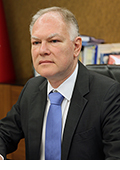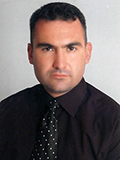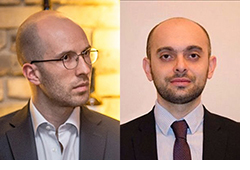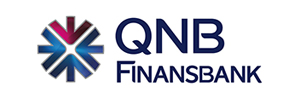| If you can't view the email, please click here. |
|
|
|
Spring 2017 Vol. 16 No. 1 |
|
From the Desk of the Editor
Süreya Martha Köprülü
This issue of TPQ comes at a time when global instability is arguably at its highest point since the end of World War II. The Western-led liberal world order that emerged in its wake, anchored by NATO and bolstered by multilateral institutions such as the European Union and the World Bank is fraying, and the principles upon which the order was founded are being undermined. Furthermore, the predominance of populist rhetoric is swinging the political pendulum in an illiberal direction.
Against the backdrop of a rebalancing global order, Turkey’s position remains tenable. What is becoming increasingly clear though is the fading away of Turkey’s EU accession prospects, as well as its commitment to reform. With Erdoğan now having clinched an executive presidency with 51.4 percent of the vote, it remains to be been seen how EU-Turkey relations will develop.
In this issue of TPQ, our authors take stock of major fault lines in the Western liberal order – both on a geostrategic and normative level – to provide more insight into the seismic shifts taking place across the international system, and their wider implications for stability, global governance, and open discourse.
|
|
NATO’s Ongoing Adaptability amidst Rising Security Challenges
Tacan İldem

“After the fall of the Berlin Wall in 1989 – and the subsequent dissolution of the Soviet Union – the world changed dramatically and NATO had to change with it. NATO began to widen its focus by including the management of crises beyond NATO’s borders.”
“To bolster its efforts to project stability in the Middle East and North Africa, NATO recently established a new regional hub for the South, based at its Joint Force Command in Naples, Italy. This new hub will help NATO improve its situational awareness and enhance its ability to anticipate – and respond to – crises in the region, assess potential threats, and engage effectively with regional partners.”
“Even as NATO has adapted over the years, some things must never change: The enduring bond between Europe and North America, the solidarity and resolve of all members to defend each other, and the uncompromising commitment to NATO’s values and the common peace and security of all member countries.”
|
|
|
Resetting the Turkey-EU Relationship
Selim Yenel

“The driving force of any candidacy lies in the accession process for membership. By mid-2010, the possible remaining negotiating chapters that could be opened [in Turkey’s accession process] ran out due to political obstacles.”
“When the numbers of migrants streaming into the EU became a torrent, the EU reached out to Turkey – albeit initially very timidly – to resolve the matter. The EU was facing a crisis that was not of its own making and required third party assistance. This was seen by Turkey as an opportunity to reassess the relationship and bring it back on track.”
“As a candidate country, Turkey still believes in the EU ideal. It is a strategic choice that has been supported by past and present Turkish governments. Yet times change and neither Turkey nor the EU are the same as they were even 10 years ago. The EU will concentrate on Brexit for the next two years, while Turkey is facing multiple challenges in its neighborhood and beyond. However, the dictum that both need each other is all too real.”
|
|
|
Tackling Populism in Europe with a New Form of Public Diplomacy
Bernd Hüttemann

“In the past decade, democracies have been tempted to simplify decision-making by referenda, simple bipolar majority voting, centralization, or presidential leadership. All of this simplification provided fertile ground for populist uprisings.”
“Democracy is not finished in Europe. The central movements are holding the line. But the multilevel political system of the EU is young and fragile and can be easily threatened by rising authoritarian governance: candidate countries are also vulnerable.”
|
|
|
Pulling the EU out of its Existential Crisis
Sebahat Demirci

“The factors deriving from the economic crisis such as increasing poverty, unemployment, and imposed austerity play a crucial part in the rise of extremism in Europe. Besides this, the migration crisis has also given way to the rise of populist and nationalist movements in Europe by putting the EU’s core values under threat.”
“By moving away from its traditional enlargement policy, the EU is not only sending a confusing message to the countries aspiring to EU membership, but also undermining the credibility of the accession process with regards to the stabilization and political consolidation of its neighbors.”
|
|
|
The Future of Europe’s Defense: NATO or an EU army?
Şafak Oğuz

“The conflict in Ukraine demonstrated that despite the ambitions of some members and the concrete steps that were taken, the EU has not succeeded in developing effective security and defense policies with global impact. The major cause of this failure has been the inherent difficulty in reaching consensus among the 27 member states, which often pursue different agendas.”
“The EU is at a crossroads in deciding which deterrence platform to adopt against the threat of Russian hybrid warfare: a European military under The Common Security and Defence Policy, or NATO, which already fulfills the security task of deterring and dissuading Russia against incursions in Europe.”
|
|
|
Russia’s “Post-West World Order”: Why Turkey Matters
Maxim A. Suchkov

“For Russia as much as Turkey, the idea of being rejected by the West is a uniting factor – at least for the time being. The more Russia and Turkey are being alienated in the traditional European/transatlantic security framework, the more the two will seek opportunities for a mutual engagement.”
“Since the end of the Cold War, the truly inclusive pan-European security system that in Moscow’s view could fully embrace Russia, failed to be created. The prospects for such a system also look fairly bleak until 'Russia-West confrontation' remains the dominant paradigm, with Russia being perceived as a threat to the European security rather than one of its guarantors.”
|
|
|
Trump’s First 100 Days and US-Turkey Relations
Megan Gisclon

“Erdoğan and Trump’s first meeting on 16 May 2017 was chalked up to a ‘photo-op’ for Erdoğan to gain legitimacy in the West, and the press conference was largely devoid of substance – having highlighted the historic US-Turkey relationship rather than focusing on the issues at hand. In the US press, the meeting itself was overshadowed by Turkish security forces’ violent assault of protesters outside the Turkish Embassy.”
“In the first 100 days of the Trump administration, it can be gleaned that while the US and Turkey may have similar interests, such as fighting ISIS and stabilizing Turkey’s region, the two allies have competing means of pursuing those interests. Trump’s personality, transactionalism, and reliance on the US military to develop policies in Syria and Iraq have demonstratively shaped the US-Turkish alliance within the administration’s first 100 days – in some ways towards but by and large away from Turkey’s interests.”
|
|
|
Turkey under Cyber Fire
Alper Başaran

“Cyber attacks can have a variety of goals including propaganda, intelligence gathering, and the denial of service. For example, a denial of service attack targeted Turkish Airlines, Turkey’s national flag carrier, in 2012. The six-hour attack resulted in an estimated loss of around 250,000 dollars and thousands of customers that could not purchase tickets or proceed with online check-in.”
“Placed in a difficult geopolitical area, Turkey is constantly under attack. The failed coup attempt on July 15th 2016, demonstrated how quickly and dangerously the political situation can change. The period following the failed coup has seen a growing demand for national cyber security solutions in order to replace imported ones.”
|
|
|
Populism and Closing Civic Space: A Post-Truth Challenge
Hilal Tekmen

“The rise of populist leaders around the world, the recently adopted majoritarian vision in the US and Europe, and the awakening of authoritarian-like leaderships all pose an existential threat to the fundamental values and practices embraced by democratic societies as we know them. Freedoms that are recognized as non-negotiable are eroding in the current political climate.”
“Robust civic space is observed in developed countries that have low levels of inequality and hold fair elections. However, research shows that currently a mere three percent of people live in countries where their fundamental freedoms and rights are both enabled and secured by governments.”
|
|
|
The New Turks: How the Influx of Syrians is Changing Turkey
Selim Koru & Omar Kadkoy

“Currently, Syrians already make up about 3.6 percent of Turkey’s population. Taking into account Syrian demographic trends, by 2040, almost five percent of Turkey’s population will be made up of people of Syrian origin.”
“The Assad regime has alienated a significant chunk of its own population, while Turkey – despite its faults – accepted millions of refugees. For many of the millions of Syrians now in exile, this is not a trivial matter. Turkey’s moral stance will likely give it great authority over a highly politicized and partly militarized Syrian diaspora.”
|
|
|
Shifting Balances of Power in the Syrian Conflict
Serdar Ş. Güner & Dilan E. Koç

“The Syrian conflict evolves at such a pace that ally-enemy distinctions become blurred almost daily. While they are NATO allies, the US and Turkey disagree on the issue of helping Syrian Kurds militarily so that they can be of use in fighting against the so-called Islamic State of Iraq and Syria (ISIS).”
“Overall cooperation between the US, Russia, Turkey, Syria, and Iran is very desirable but not attainable in the current conflict. No perfect alignment of interests is possible among these states.”
|
|
|
Interested in contributing an op-ed to TPQ's blog?
For guidelines click here. |
|
|
The Premium Corporate Sponsor of this Issue
 |
|
|
This Issue's Sponsor
 |
|
|
Thanks to Our Media Partner |
 |
|
|
 |
Phone: +90 212 621 4442 - +90 212 621 9258 Fax: +90 212 531 8718 info@turkishpolicy.com
Click to unsubscribe |
|
|
